One of the biggest problems that a prepper faces is finding the space to store the food, water, medical gear, and other supplies that help to mitigate one’s risk against disaster.
For many, the attic may be an appealing source of the extra space necessary for convenient and organized storage of preps.
However, there are some things that need to be taken into consideration before just throwing all of one’s gear up into an attic.
Humidity and extremes of temperature can play havoc with particular items, and thus need to be thought of.
Related: How to Keep Moisture and Pests Away from Your Food Stockpile
So, let’s take a look at 7 things that should never be stored in the attic.
Batteries
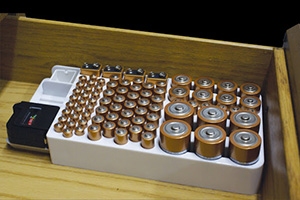 I hate buying batteries. It always feels like such a waste. They’re inherently expensive (at least, if you want to buy quality), and I always feel like they lose their juice well before they actually should.
I hate buying batteries. It always feels like such a waste. They’re inherently expensive (at least, if you want to buy quality), and I always feel like they lose their juice well before they actually should.
The fact of the matter, however, is that you do need them.
Making it through a day without an item in your household that relies upon batteries is already hard enough as it is; now consider what level of difficulty that would take once the power goes out. It’d be incredibly inconvenient.
And so, preppers store batteries. It’s unfortunate that the lifespan on these is already short as it is, but you can most certainly shorten that lifespan by exposing these things to extremes of temperatures (aka, leaving them in your attic.)
Batteries are one thing that I’m an absolute stickler on protecting. They simply cost too much money to throw away. As such, you should do everything you can to keep them good for as long as is possible.
This not only helps to ensure that you have an adequate supply of them for when disaster strikes but will ultimately save you money for other preps in the long run.
Ammunition
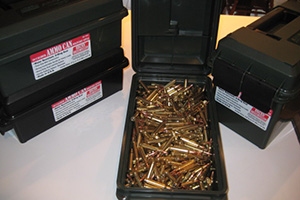 Unless you’ve been living under a rock the past two years, you’re familiar with the sky-high cost and scarcity of ammo at the moment.
Unless you’ve been living under a rock the past two years, you’re familiar with the sky-high cost and scarcity of ammo at the moment.
Nobody wants to have spent years and thousands of dollars establishing a well-stocked stash of ammo only to have it destroyed by corrosion.
Yet if you store all of your ammo up in your attic, this is exactly what’s likely to happen.
Have you ever had to work in your attic during the middle of July? It was dangerously hot, right? Muggy too?
Now imagine having thousands of dollars of ammo up in that environment. When it comes to ammunition, humidity is the enemy. As a result, you need to avoid storing your investment here at all costs.
Firearms
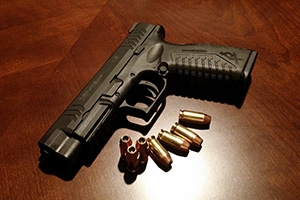 Rust and guns do not mix.
Rust and guns do not mix.
Aside from ruining a family heirloom or an $800 investment, rust can also just be plain dangerous when it comes to firearms.
Who wants to shoot a gun where the barrel has a weak spot halfway through? Not me, and neither do you.
It’s absolutely vital that we protect our firearms against such then. One of the best ways that we can do this is to store our firearms in a dry environment that’s not subjected to extremes of temperatures: aka, not your attic.
Food
We store food so that it’s there when we need it. It’s the whole concept of prepping a larder.
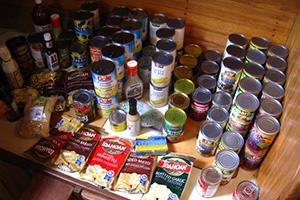
However, if you’re storing your food investment up in your attic, you’re likely to not have much at all when disaster strikes.
Exposing canned and dried goods to the high temperatures and humidity levels that are constantly present within an attic (throughout most of the year, anyway) is a surefire way to help your food’s shelf life to decrease exponentially.
Post-disaster, getting sick is nothing to sneeze at, and if you’re already going to have a difficult – if not impossible – time accessing appropriate healthcare during this time, shouldn’t you do what you can to ensure that the food you eat is safe?
Water
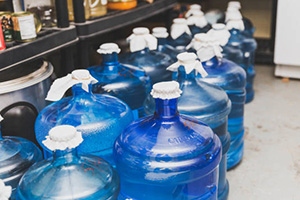 The reason I don’t store water in my attic isn’t necessarily that the water will go bad, if you will, but instead that it will become dangerous over the long term. Let me explain.
The reason I don’t store water in my attic isn’t necessarily that the water will go bad, if you will, but instead that it will become dangerous over the long term. Let me explain.
You’re not going to drink water that’s been stored in your attic and then drop down dead.
Instead, what’s going to happen is you’re going to be drinking a lot of stuff that could have unpleasant long-term consequences.
Most of us store our water in plastic of some sort. This could be just grocery store-supplied plastic jugs, small little bottles, plastic drums, or plastic bricks.
Related: What Is The Best Way To Store Water For SHTF?
Whatever method you store it in, the more heat that the plastic is exposed to, the better your chances that your water is going to be laced with plastic molecules when it comes time to drink it.
Camping Fuel
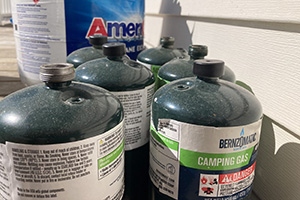 I feel like this one is pretty obvious. Attics can get pretty hot.
I feel like this one is pretty obvious. Attics can get pretty hot.
And while they’re unlikely to ever get hot enough to reach the flashpoint of most types of fuel out there, they are likely to get hot enough to cause the canisters to produce vast quantities of vapor should they be given the opportunity.
Propane can that’s rusted out a completely unnoticed hole can very easily fill your attic up with propane in the hot summertime without your notice.
Should you then go up into that attic to get something – should something fall – there’s the possibility that either static electricity or some other form of spark could be produced that would blow your roof to kingdom come.
So please, don’t store your camping fuel in your attic.
Medicines
Most of us understand the importance of storing proper medical gear in the event of a disaster. It’s likely that your medical supplies aren’t limited to just bandages and gauze as well.
Various OTC drugs, as well as prescriptions, are going to be within your kit as well, and just like with ammo, you need to ensure that you are taking care of them so that they can last as long as they possibly can.
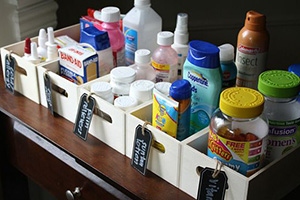
True, medication already has an expiration date as it is – and taking it past that date can easily prove dangerous – but there’s no need in exposing your medicines to temperatures that will cause them to break down and degrade (potentially into something dangerous) even faster.
Related: The Real Expiration Date of Common Drugs in Your Cabinet
Heat is a powerful catalyst in chemical reactions, and the space in your attic will be no exception to this rule. As a result, it’s best to ensure that you are storing your medical kit in a more controlled environment.
What’s Okay to Store in Your Attic
If there were any particular items that I would actually advocate for storing within an attic they would be clothes, books, and camping gear.
Clothing
Most of us do what we can to ensure that we have the appropriate attire for a number of weather conditions, and clothing is incredibly bulky.
Storing this clothing out of the way in containers within your attic shouldn’t pose any threat to the gear whatsoever.
Books
 Likewise, many preppers out there have rather extensive libraries when it comes to disaster preparedness, infectious disease, bushcraft, and emergency medicine.
Likewise, many preppers out there have rather extensive libraries when it comes to disaster preparedness, infectious disease, bushcraft, and emergency medicine.
These book collections can quickly prove to be substantial and threaten to overtake great parts of your house.
Books can easily be stored within the attic with little to no fear of any problems.
Obviously, I wouldn’t store any rare and incredibly valuable books within the attic, but for the rest, there shouldn’t be any problem.
Camping Gear
I see no problem whatsoever with storing bulky sleeping bags, ground pads, hammocks, tarps, and tents up within an attic space.
It’s hard to find a prepper that doesn’t have some form of camping gear tucked away somewhere, and the problem is that such is notoriously space intensive.
Given that and that camping gear has little to fear from humidity, it should be fine in such a place.
Final Thoughts
An attic is a very pleasant addition of space to any house, greatly improving your storage capacity. However, it’s best to know what stores well within it, and what will quickly either degrade or prove dangerous if left in such an environment.
By following the above steps you should be well on your way to ensuring that what you do store in your attic won’t suffer any negative consequences from its location.
Do you have other thoughts on the subject? Was there something that you felt as if we missed? Have you ever lost any supplies due to storage within an attic?
Let us know in the comments below!
You may also like:
32 Weather Proverbs that Are Actually True
What Happens When You Keep Your Meat in Salt For 1 Month (Video)
How to Can Water for Emergencies
The Best Places in America to Outlive the Upcoming Economic Depression

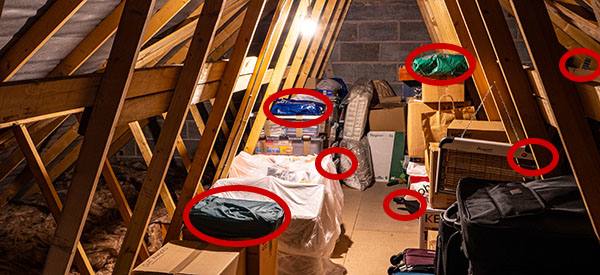














Good article. Thank you.
I wouldn’t store books or papers in the attic. They will deteriorate quickly in the heat and humidity up there.
Also as to clothing. I was given many quilts from my Bubbe. She stored them in the attic. All of them were discolored and the material was disintegrating. Out of the 20+ quilts I was given, only 2 were in ok shape. Such a waste.
Just my 2 pennies worth.
Peace,
MadFab
Heat will eventually destroy everything in the attic. Heat and time are the enemy.
I store toilet paper and paper towels in my attic…never a problem
I store some books up there, but they are stored in moisture proof containers that seal off. Everything I store in the attic are in these containers.
DYNAMITE! Great stuff for removing rocks, tree stumps and whatnot. It might not be a good idea to store, at all. BUT if you do, store it at an even temperature. In a hot attick, the sticks may “sweat”. Except it is not the salty stuff that you produce yourself, the “sweat” is nitroglycerin. Yeah, the real stuff. Blows up at the slightest provocation. Discuss with Alfred Nobel.
Be very careful handling dynamite. When I was a teenager, I did not know that and got nitroglycerine poisoning. I did not know it would affect me my entire life. At 65 I had a suspected heart attack, and they gave me nitro, standard procedure. It almost killed me. If I am given nitro again it will kill me.
Where I live, an attic is the very last place you would ever put anything. Way too hot in summertime and gets surprisingly cold in winter. Better to find alternative places to put things. Even if you have to build a shed or a false back to a closet, drawers under beds. All better solutions.
Anything that is not stored at consistent relatively normal temperatures and humidity levels will deteriorate over time. Anything of value is best stored in your normal living space regardless of the material of which it is made. Even then, photos, important papers, media, woven materials should be placed in acid-free storage containers or wrapped in acid-free paper. Check out Gaylord Archival Supplies online for some more helpful information on long term storage.
CC: Good comment. Libraries all over the world are fighting the loss of many important literary tomes due to their having been printed on acid washed paper from about the mid 1800s to about the mid 1900s. It is an on-going struggle that was largely unknown until librarians suddenly noticed their books disintegrating on the shelves.
If you have a valuable book, whether from being a first edition of a very popular book or just a family heirloom that may have no commercial value but immense familial value, and the pages are all crispy and brown, you have high acid paper. Check with your local librarian to get the names of companies that will undertake to reverse the process.
Alas, my family bible with the names of who married whom, who was born when, who died when and other familial data has been treated in a cavalier fashion. I just came into possession of it and it is a family tragedy. It has passed beyond the point of being able to be restored.
In our printing business, we did various forms of binding and acted as a broker for a bookbinder/restorer in Los Angeles. All too frequently someone one would bring in a family bible that had been stored in a damp basement or a hot humid attic and wonder if it could be rebound and somehow restored and all too frequently the answer was that the best that could be done was to build a custom box that would fit the scraps of paper and keep them all together.
If you have a family bible from decades or centuries ago, please do not delay in taking active steps to either rebind it if it is in rebindable condition or somehow preserving it for generations to come. Seek out a bookbinder who has been in business for a long time and consult with them. You will find them in larger cities. And for posterity’s sake get it out of the basement or the attic if they are not dehumidified and temperature controlled.
LCC- Unfortunately, you are not alone. Bibles, cook books and hymnals are the books most families want to keep, but fail to protect. Autographed copies and/or first editions are good choices to protect too as well as historical maps.
LCC, City Chick, etc al:
Don’t forget silverfish and book mites! They eat glue, paper, leather, etc. and can damage books quite a bit before you realize you have a problem. Be sure you check your books on a regular basis, and try to keep them dusted. It helps.
PS: Left Coast Chuck: I figured it was just spell check or an honest error…I don’t think he meant to insult you. Fwiw, I think he would have been much more direct if he had a problem with something you said. There aren’t many shy violets around here, you know?
Miss Kitty; You are correct on one point. If I was intended to get snarky…you can bet I would have. But, left coast CHUCK has been on here a long time and I’ve never had a problem with him.
Having said that, my problem is with my left eye. I have “temporal palloring”…damage to the temporal lobe from a severe blow to the head. Ergo, many letters or combinations thereof will look like something else. Hence a “ch” looks like a “d” to me. And I have always read his name as “duck”. It is frustrating for me, but I have learned to deal with it. Throw in temporal lobe memory loss and dang what a disheartening feeling.
Bottom line, if someone insulted me with respect to my mother…then I am going to get peeved. Or my education for that matter. I’ve NEVER attacked a person’s parentage because I don’t know what their upbringing was like. However, no sense in belaboring the point. This site is about information of which I have gained much knowledge over the years. 🙂
Izzy – You are the best!
Izzy: My apologies for going off on you. I had just read a snarky comment about Raven and Illini and then I read your comment calling me “duck” and thought it was more of the same.
I think the biggest majority of posters to this list attempt to provide information that they sincerely feel is helpful, some of us are more articulate than others. Hey, that’s just the way life is. Not all of us can polish the written English word like Winston Churchill or William F. Buckley Jr. I wish I had their command of English and the polished way they set down the written word and uttered the spoken word.
I may not agree with everything that they said or wrote but I certainly appreciate the way they said it or wrote it.
One of the things I like about this list is that most of us are civil toward each other. We may disagree. That is another great thing about this list. We can disagree like gentlemen and ladies should, civilly without indulging in personal insults. Unfortunately that aspect of times gone by is sadly lacking in today’s society where too many seem to think sticking their fingers in their ears and screaming “Nahnahnah, I can’t hear you,” is adult conduct.
I would proffer you my hand if I could but the best I can say is I was mistaken and I am sorry for the mistake.
I’m truly sorry to hear about your injury. I think I would rather have a leg hacked off than have a brain injury. The workings of our brains are still a mystery to the folks who deal with such and unfortunately too many times they just don’t know how to deal with such problems.
I wish Hollywood and television would get it correctly. Getting struck on the head is no minor matter. Somehow in all the writings and entertainment shows the hero get struck unconscious from a blow on the head and is able to, 30 second later, get back in the fray full bore. As we are finding out with all the brain injuries coming back from the endless combat we send our young men and women into, brain injuries are far worse than other injuries that may look worse because they are on the outside.
I hope time will offer some measure of healing.
Thank you left coast chuck. Apology accepted. We all make mistakes…I know I do. Btw: I am quite fond of “ducks” and go to the ponds every week to feed them.
My own horror story about a family bible… my great grandparents’ heirloom was used as TP when the sears catalog was used up.
https://www.gaylord.com/
https://www.gaylord.com/
To store any survival gear in an attic it needs to be in a sealed air tight container, Metal will rust and and cloth will deteriorate and plastic will get brittle. Oxygen and water are your enemies!
macsriggs: You are correct regarding survival/camping gear being sealed in an airtight container whenever possible, with a couple exceptions. Inflatable sleeping pads and sleeping bags should never be stored for long periods rolled up or in their stuff sacks. The pads should be left inflated, but not sealed, and stored flat either against the back wall of a closet or under a bed. Sleeping bags are best stored on a wooden hanger, or if you are short on closet space they can be stored unrolled under a bed or lightly stuffed into a pillow slip.
I’d be hesitant to store a tent in the attic, even in a sealed container. The temperature extremes can cause the seam seal to break down over time, and you don’t want a leaky tent if you’re suddenly in a survival situation.
One more thing; ALWAYS make sure your gear is clean and dry before storing it.
You can always insulate your attic and tap into the HVAC system for humidity and temp control. Are we not supposed to be smart people.
Good to know.
Water stored in attic: What if the water is kept cool during the summer months, as not more than 60f and the same in winter. Also kept in the dark. The only time there may be any light is when the room is visited and that is briefly less than five minutes on a weekly basis.
One of the things I like about this site is that personal attacks are really at a minimum. While some posters comments are at best not very helpful, there are occasional comments from those individuals that do make sense and contribute to the value of this list.
Personal attacks, while they may alleviate the angst of the poster (see second definition) they really add nothing to what we are seeking which is knowledge that may help each of us survive a significant catastrophic event in our lives.
I know that sometimes I fail in my endeavor to only post positive comments, but I do strive mightily to avoid personal attacks. I do feel free, however to return fire, so to speak, when I see personal attacks even if not directed at me.
Switching from the negative to the positive, storing firearms in high heat and humidity is possible. Various containers now emit vapors that during the lifetime of the container inhibit formation of rust and other corrosion.
For example, here is an item from Midwayusa.com: Otis Rust Stopper Long Term Storage Kit Product #: 562009.
I am sure one can find similar products of the 21st century replication of the country general store, Amazon.
You might search other firearms accessory suppliers such a Natchez Shooting Supply or Brownell’s for similar items.
The rifle cases emit a rust preventative vapor which I have found works satisfactorily in my climate for at least five years. Now, I would be the first to admit that humidity in SoCal, even close to the shoreline is a rare commodity. When the humidity gets as high as 50% we feel like we are in a steam bath and that is only for a rare few days a year. It is not rare to have humidity in single digits. That is what we have in our fire season. We are like Alaska where the tour guide joked that in Alaska there were two seasons, winter and road repair.
SoCal also has only two seasons. Low fire hazard and high fire hazard.
I do know what high heat and high humidity are like. I grew up in southeastern Pennsylvania where 90° F and 90% humidity at 0300 was not unusual during the Dog Days of summer and before a/c. A/C was so rare that venues that had it usually had a big banner outside advertising that fact.
I also spent two years on Okinawa on a free vacation paid for by the taxpayers of the country, thank you very much. And also 18 months on Taiwan also courtesy of the U.S. taxpayer. My gratitude for that vacation is not as effusive as for the vacation on Okinawa. Both of those locations are infamous for quite high temps and humidity. A bundled package. And, of course, in that era neither of them had a scrap of a/c. Personal cooling was performed by hand held fan.
We kept a 20 watt lightbulb in our wall lockers on Okinawa to keep our clothes from molding and our rifles and other steel equipment from rusting. Boots left under your rack at night would be starting to grow mold by reveille in the morning. I have long experience with mold, rust, heat and humidity.
In light of recent political events it might be prudent if one has firearms that perhaps are below the radar, so to speak, and wishes to avoid possible seizure of same, some secure place other than with your Uncle Harry’s farm in some freedom loving state, an unobtrusive location might just be in order and the vapor protection bag could be the answer to storage close at hand.
Before the VP bags were available I used to store steel items with a heavy coating of Vasoline and then wrap them in a heavy layer of waxed paper. That was if I were putting them down for long term. Short term had to make do with a frequent application of oil. Removing Vasoline wasn’t as labor intensive as removing Cosmoline, but it was a close second.
For those of you who have never been in the armed services, in days of yore, Cosmoline was a very heavy brown grease that the U.S. Armed Forces stored their steel items in for long term storage.
Even today, if you purchase ComBloc firearms from an importer you are liable to find them shipped to you with the ComBloc country’s version of Cosmoline.
I might add one further note. You can also purchase, although I don’t have a source, thin tubes of the vapor emitting material to store in the bore of your firearm.
Were I to institute a search right after reading this post, I would look for “bore saver,” “rust preventing bore saver,” “VPI tubes” — I don’t know what the “I” stands for but my recollection is that I have seen the protectants described as VPI.
Thank you for the great tips left coast duck. I am going to search for Cosmoline.
Thanks, Izzy. Apparently you didn’t read the introduction to my post. Wise ass comments don’t really help. You may feel superior in posting such on line but it only exhibits what a sage once said: It is better to remain silent and be thought a fool than to open one’s mouth and prove it to one and all.
Your smart ass comment did nothing but prove to one and all reading it that your IQ is exceeded by the number of buttons on your shirt front. Or is your idea of formal attire a wife beater and long boards that slip down around your ass?
Isn’t it a bother when you have to run from the cops to have to hold your shorts, tripping when you let go of them and getting proned out with a Glock in your ear?
Did your mother drink and take dope while she was pregnant with you? Is that why you emerged brain dead? Or were you whacked around so much by your drunken old man that he damaged what little brain material you originally had?
What “smart ass” comment did I make? I posted a sincere comment to you and you came back with a litany of insults.
Fyi: I served 21 years in the military and 14 years as a deputy sheriff. Plus, I went ALL the way in college. My mother neither drank alcohol or did drugs.
Quite frankly, I don’t care what you think. You have shown yourself to be nothing more than a hypocrite espousing one thing and doing the opposite.
Looks like Izzy may have been a victim of auto correction function on his iPad or pc LCC. Izzy that Happens to me all the time!
Izzy: When you address me as left coast duck, what am I to think about your comment? I took that as a personal insult. If you insult me, do not expect me to just say, “Oh well, have a nice day.”
And here I thought that Raven and Illini Warrior were the
only ones that were off their meds.
You owe Izzy an apology!!
Auto complete is out of control, everybody fights it all day long. A preview of life to come as AI gains control of everything.
Sorry to have upset your sensibilities.I have to call it like it is. We both know that they are boils on the butt of humanity
I use Cosmoline for rust protection when I restore old cars and is used in the insurances auto body shops now. Thanks for reminding me about that I still have some and will use it when the time is right.
its nasty stuff but very effective…
Red ant: Yeah, it is a bear to remove but it certainly is effective if your firearms are going to be in extreme climates. That’s the reason it was formulated for the armed services. A crate of rifles might be shipped to some highly humid tropical island location to be further shipped to some dry, hot sandy location in some middle eastern desert to be further shipped to some high altitude region in Afghanistan.
I don’t know if U.S. forces are still using cosmoline. I haven’t heard any complaints from current service personnel about the difficulty in removing it from weapons parts.
We used leaded gasoline to remove cosmoline from our rifles, with our bare hands no less. A process that would cause an OSHA inspector to melt into a pool of governmental lard. I guess it couldn’t have been too bad to wash cosmoline from an M-1 with leaded gasoline. I’m still here after a long list of verboten exercises.
I saw a comment about the dangers of drinking water if it has been stored in plastic bottles. I have frequently pointed out in an end of the world situation, free floating compounds of fluorocarbons in your drinking water are going to be way down on the list of immediate problems that might kill me. In any event, if it is that big a concern, they can be ameliorated by boiling the water in an open container as their vapor pressure is less than water.
I have found a coating of Vasoline to be effective in our SoCal climate to prevent rust, especially when covered with waxed paper to protect the Vasoline. It may be in an especially humid area such as an uninsulated shed in the southern coastal regions Vasoline may not be enough to prevent rust on a firearm stored away. I haven’t had the hands on experience to determine if that is the case. If you can purchase some cosmoline on line, perhaps, that would be the best time-tested rust preventative to use on firearms. Just be sure to clean your firearm thoroughly before placing it back in service. No need to worry about lead in the gasoline you use to clean the firearm. I don’t know if leaded gasoline as available in other states but it certainly is not available here in the PDRK.
LCC
yes I have to use paint thinner to clean my guns when I spray cosmoline up in the frame rails and yes I can get it at work and have some right here and will use it to do what it is I need to do with it. lol
it is very toxic and have to be carful breathing the vapors. I think it will come in handy for other things also. yes, i’m still here as well so maybe only toxic if you drink it or get into your eyes. lol but vapors are very harmful. Thank for reminding me…
PS:
I think lzzy was just trying to be funny. but did not realize that our preppers names that we give our self’s dose mean some thing to each one of us and we do not like it being made fun of. so maybe just a mistake. no harm just a mistake lzzy and left coast chuck. hope were cool… Ya.
How about if we lock Raven and Illini Warrior in the attic.
That way they can argue and disagree with each other.
What is also a very common problem in attics is the potential for animal damage. Squirrels and raccoons, rats and mice and to a lesser extent bats and birds can cause a great amount of damage to stored items in any area that they decide to invade. Also rodents like to chew wiring, which can cause fires and they pee and poop everywhere which can cause disease.
If you do decide to store things in the attic, you will want to check it thoroughly for signs of animal activity first and take corrective action.
You should do it regularly anyway, just to make sure you don’t have issues down the road from animal damage. Check also for bees and wasps and have them removed.
Properly insulating your attic area can help a bit with temperature extremes, and will increase the efficiency of your heating and cooling systems.
Our attic in our old house was never prone to mold that I recall, but we lived inland then and it was seldom humid except for a couple of weeks in the summer. But it was hot!
My attic is above my garage, which is semi-detached from the house. We do get varmints in there. There were old books (cookbooks from the 70s, largely) stored up there when we moved in. Most were chewed up, and lots of them were brittle.
You’re right on the nose about getting it checked for animals. We have a pest control guy go up there every three months. We made the mistake of not having it inspected for a year, and found out that raccoons had moved in.
You are so right about the raccoons Omega. I had a whole clan move in and it took forever to get rid of them. People don’t realize how clever these little suckers are.
lzzy
if you get racoon’s or any other varmint. you can buy some Fox piss and spray it around the area that they are a.t but not any were they are are coming and going in at.
it works good and keeps them away.
Ohhh…thank you for that tip red ant. My area has had a problem with coons for years. My problem was…I didn’t know they were in my attic because it is 2 flights of stairs up and I didn’t hear them for the longest time. Finally I went into the attic and gad zooks…what a mess. It took me about 18 months to completely get rid of them.
Don’t store old pictures, slides, 8mm Film or VHS tapes in a hot attic. I convert that stuff to digital formats for a living and I’ve had to tell customers, “Sorry, you memories are ruined. The film smells like rotten Kimchi, the VHS tapes have enough mold it’s growing mushrooms, the pictures a fused together and the slides have changed colors
OTOH, Mr. Z, how stable is electronic media even in digital form? Isn’t there a problem with the data being corrupted with transient currents? Isn’t there a problem with whatever program or format you are storing the information on is someday going to be replaced by some newer, more sophisticated storage format and the devices that can read the outdated format slowly disappear from existence?
I am thinking about 5.25 floppy disks which really were floppy. Are there still readers for such antique media? I would suspect that some of our list followers have never even seen a real live 5.25 floppy disc.
I think there are probably still some data retrieval services that can retrieve data from 5.25 format but I would expect that the cost of such service would mandate that only information worth a considerable amount of money would be worth retrieving if such service does exist.
LCC, my computer ownership began in 1985 with a Commodore 64, and it used 5.25″ and 3.5″ floppy’s. Then newer PC’s that also used the 3.5″ floppy’s, then CD’s, then DVDs, then memory sticks, and I still have a few of my older PC’s with long outdated programs and operating systems that will still function as stand-alone readers, and have thought about transferring any data I want to keep that is on old media by saving it on the highest compatible media device it can be transferred to on the older PC, then working my way up passing it from device and media storage until I have what I want stored on current data storage devices like memory sticks. And I know there are companies that will do this for a fee, but you need to send them only what you want saved, and I have several boxes of old media storage that I would have to sort through all the data files and also check to see if any data files I wanted to save can even be accessed with current operating systems, so I might as well transfer the data myself while doing that from one device to a higher device, gradually reducing the amount of storage devices because of larger capacities, and not be concerned about getting rid of the old versions that are taking up storage space. Then store the memory sticks in a small “Faraday Cage”.
Hi EVERYONE
I have been storing items on the top floor of my home for over half dozen years with no problems. After the ice is gone outside the A/C gets installed and it keeps that room cool to no higher than 60 degrees and dry. during winter that same room gets no heat, therefore, the temperature is no higher than 50 degrees and no lower than 45 degrees.